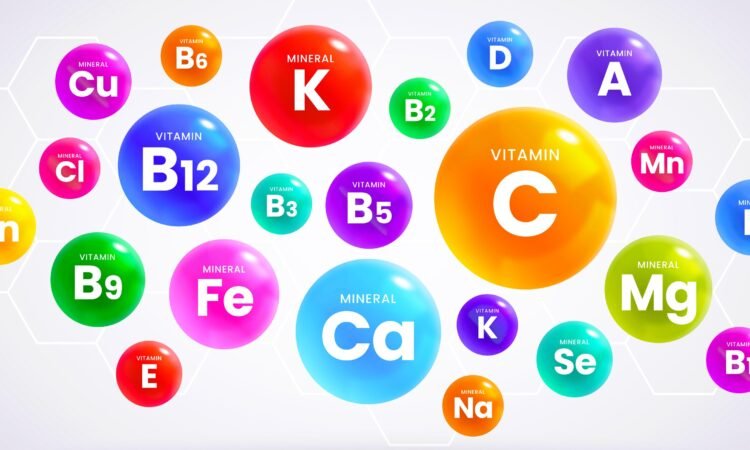
Here are the benefits of vitamin B12 and potential deficiencies that can occur when there’s an inadequate intake:
Benefits of Vitamin B12:
- Red Blood Cell Formation: Vitamin B12 is essential for the production of healthy red blood cells.
- Neurological Function: It plays a crucial role in maintaining healthy nerve cells and supporting proper nerve function.
- Energy Production: Vitamin B12 helps convert food into energy by aiding in the metabolism of carbohydrates and fats.
- DNA Synthesis: B12 is involved in DNA synthesis and cell division, crucial for the growth and development of all cells.
- Brain Health:Adequate B12 levels are linked to cognitive function and may help reduce the risk of cognitive decline.
- Mood Regulation: B12 plays a role in the production of neurotransmitters that affect mood, such as serotonin and dopamine.
- Heart Health: B12 helps regulate homocysteine levels, reducing the risk of heart disease.
- Supports Bone Health:** It aids in the formation of bone cells and may reduce the risk of osteoporosis.
- Skin and Hair Health: B12 supports healthy skin and hair growth.
- Eye Health: Adequate B12 levels are important for maintaining good vision.
- Digestive System Support: B12 supports the production of stomach acid and digestive enzymes.
- Immune System: It contributes to a healthy immune system by supporting the production of white blood cells.
- Fetal Development: Adequate B12 during pregnancy is important for proper fetal development.
- Reduces Anemia Risk: B12 deficiency can lead to a type of anemia known as megaloblastic anemia.
- Supports Muscle Function: B12 helps maintain muscle strength and coordination.
- Anti-Inflammatory: It may help reduce inflammation in the body.
- Nerve Myelination: B12 supports the myelination (protective coating) of nerves, which aids in their proper function.
- Liver Health: B12 contributes to the detoxification process in the liver.
- Metabolism Support: It assists in the metabolism of amino acids and fatty acids.
- Improves Sleep: Adequate B12 levels can contribute to better sleep quality.
- Reduces Fatigue: B12 deficiency can lead to fatigue and weakness, which can be improved with supplementation.
- Aids Digestion: B12 supports the health of the gastrointestinal tract.
- Anti-Stress: B12 plays a role in stress reduction and mental well-being.
- Regulates Hormones: It helps regulate hormones such as melatonin, which affects sleep patterns.
- Reduces Risk of Birth Defects: Adequate B12 levels in early pregnancy can reduce the risk of birth defects.
Deficiencies of Vitamin B12:
- Anemia: B12 deficiency can lead to megaloblastic anemia, causing fatigue and weakness.
- Neurological Issues: Deficiency can result in nerve damage, leading to tingling, numbness, and difficulty walking.
- Cognitive Impairment: B12 deficiency has been linked to memory problems and cognitive decline.
- Mood Disorders: Depression, anxiety, and mood swings can be exacerbated by B12 deficiency.
- Fatigue: A common symptom of B12 deficiency.
- Weakness: B12 deficiency can lead to muscle weakness and poor coordination.
- Pale Skin: Anemia caused by B12 deficiency can lead to pale or jaundiced skin.
- Shortness of Breath: Anemia can cause difficulty breathing and shortness of breath.
- Nerve Damage: Long-term deficiency can cause irreversible nerve damage.
- Tingling and Numbness: Known as paresthesia, often felt in the hands and feet.
- Difficulty Walking: B12 deficiency can affect balance and coordination.
- Glossitis: Inflammation of the tongue, causing pain and discomfort.
- Mouth Ulcers: Painful sores in the mouth.
- Vision Problems:** Blurred or disturbed vision.
- Heart Palpitations:** Irregular heartbeats and increased heart rate.
- Digestive Issues:** Bloating, constipation, and diarrhea can occur.
- Impaired Memory:** Difficulty remembering things.
- Confusion:** Feeling disoriented and confused.
- Irritability:** Mood changes, irritability, and mood swings.
- Reduced Appetite:** Loss of appetite and weight loss.
- Fertility Issues:** B12 deficiency can affect fertility and reproductive health.
- Increased Risk of Birth Defects:** Pregnant women with B12 deficiency may have a higher risk of birth defects.
- **Vision Changes:** Blurred or disturbed vision.
- **Hair Changes:** Hair thinning or changes in hair texture.
- **Increased Risk of Cardiovascular Disease:** Elevated homocysteine levels can contribute to heart disease.
Maintaining adequate vitamin B12 intake is crucial to enjoy its benefits and prevent potential deficiencies. Consult with a healthcare professional for personalized guidance on vitamin B12 intake and supplementation.




